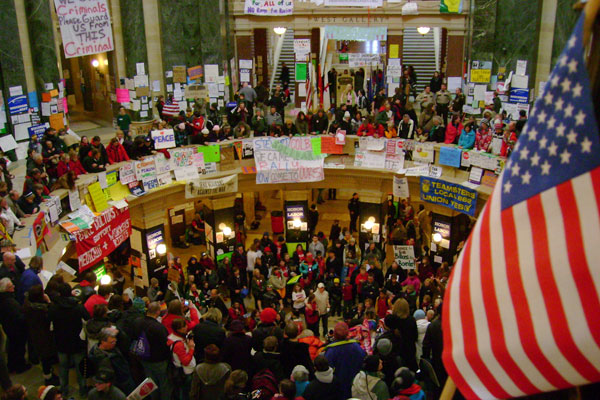
Last night I was eagerly following the election returns… the Wisconsin state Supreme Court election returns. I turned in when I heard about ballots being hand-counted, and things are still too close to call. Judging by my Twitter feed, a decent cross-section of political junkies and Wisconsinites, a lot of other people were too, as what would in many cases go completely unnoticed got national and even international attention. A small but nontrivial number of people were following the election like it was Bush vs. Gore II.
Turnout in Dane County was expected to be 50-70 percent. For a state Supreme Court election.
Meanwhile, here in Chicago, the aldermanic runoffs passed without a lot of attention or passion, despite a couple upsets, or at least arguably surprising defeats of vulnerable incumbents.
John Kass is pretty irritated by this:
On Tuesday, turnout was low in the aldermanic runoffs.
That doesn’t sound like reform. It doesn’t sound like a new era or a new day or the dawn of anything. It doesn’t sound even remotely encouraging.
It sounds more like a people beaten senseless by politics, in the city of reform and hope and change.
"Beaten senseless" is a possibility, I guess, but it’s not the only one. There’s also "ambivalence" or "complacency." Neither of which I necessarily endorse, but this is a free country. To recast a line from Voltaire (enshrined here in the walls of the Tribune Tower), I do not agree with you not saying a word, but I will defend to the death your right to not care.
For a generation Chicagoans were happy to continue reelecting Mayor Daley. Before that there was a brief period of reform and hope and change: the era of Harold Washington, which is still revered, but it also brought us the infamous Council Wars. Jane Byrne, in her upset of Machine candidate Michael Bilandic, was sort of a reform candidate, but not as much a reform mayor.
Before that, of course, there was Daley the Elder, who was quite popular.
So we know from recent but extensive history that Chicagoans have consistently supported mayors who have a reputation for wielding power, who are responsive to and receive the support of big-business interests, who are connected to the national Democratic power structure, who project a certain no-nonsense political competence bordering on aggressiveness.
Sound like any mayor-elect you know?
Maybe it’s just a matter of semantics. "Beaten senseless" sounds involuntary. I sometimes agree with the senseless part, just not necessarily with the beaten. Or, as Ben Joravsky put it, previewing some of last night’s elections:
The local reaction to the [Wilson Yard tax increment finance] project varies according to one’s worldview. There are those who think the project is another example of TIF abuse. (Count me in.) Others think TIF abuse is just the price you have to pay to get some affordable housing. (Count a lot of my liberal friends in there.) And still others hate it because they don’t want any more low-income housing in Uptown. In short—more class warfare.
Oh, yeah, then there are those who know nothing about nothing, especially TIFs, but just love that Target. Based on conversations I’ve had over the years, I’m starting to think that this faction is the majority.
Joravsky was discussing the 46th Ward runoff between social worker James Cappleman and lawyer Molly Phelan. Phelan helped lead the charge against the Wilson Yard TIF; Cappleman was against it, but because it wasn’t a sufficiently "balanced development"; Joravsky gave the edge to Phelan. Cappleman won, despite the fact that Phelan had the backing of Ed Burke and Brendan Reilly.
Meanwhile, in Wisconsin, they’re lousy with reform and democracy. Wisconsin is an odd state, politically: recently, it simultaneously produced progressive hero Russ Feingold and conservative-wonk-dreamboat Paul Ryan. Feingold of course, isn’t in the Senate anymore; he was defeated by the very conservative semi-Tea Partier Ron Johnson. It’s the state that gave America Fighting Bob LaFollette and his son; Tailgunner Joe McCarthy; budget hawk and war critic William Proxmire; and Earth Day founder Gaylord Nelson, among others.
Recently, the Tea Party movement/midterm backlash/conservative resurgence/etc. tipped the always-fine balance in the state squarely into the Republicans’ territory, producing both Johnson’s victory and Gov. Scott Walker’s. Wisconsin wasn’t alone in this; New Jersey, Ohio, and Michigan all elected conservative reform governors. As did Florida, where the reforms being instituted by Rick Scott make Scott Walker look like FDR.
But for a variety of reasons—the less obvious of which I outlined here—Wisconsin has been the flashpoint, in no small part because of its long history of having politically and ideologically strong Republican and Democratic parties.
Illinois has long supported something of a political monoculture. (This year might have been different if Bill Brady had beaten the cautious and vanilla Pat Quinn, but the groundhog saw his shadow.) We might be exciting for a lot of political reasons, but political ideology isn’t one of them.
Wisconsin’s the opposite: there are two consistently strong parties which often produce ideologically distinct candidates. Now there are movements of varying momentum to recall eight state senators… from each party. A run-of-the-mill supreme court election that wasn’t supposed to be a race a couple months ago turned into a photo finish, with a couple thousand votes out of 1.5 million separating the two candidates, with the lead swinging back and forth over the past day and a half. It’s exciting, for political junkies. But not everyone likes politics, or even excitement.
Why can’t we be like our neighbors? I dunno; even if it happens it’s going to take awhile. But I don’t see much evidence that people want to be. For all the talk about Emanuel’s power, connections, and dynamism, I can’t help but think he’s comfort food: tastes like Daley, but a bit more upscale and cosmopolitan. Hey, it’s working for Longman and Eagle.
Photograph: JeanPaul Holmes (CC by 2.0)



